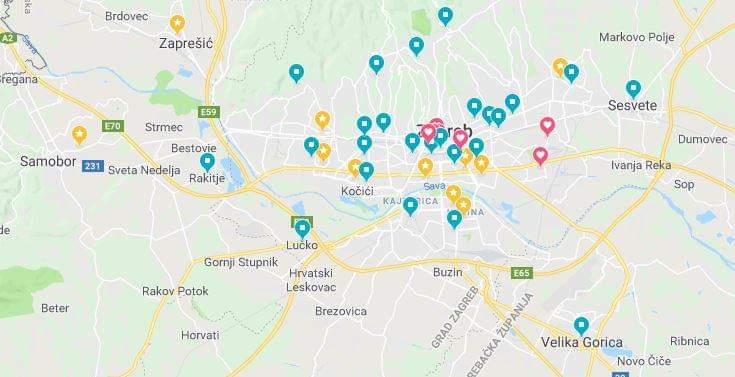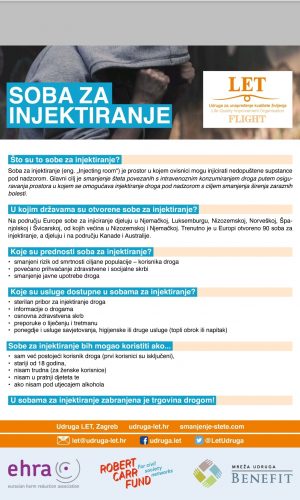FLIGHT
Life Quality Improvement Organization “FLIGHT” or just “FLIGHT” (in Croatian: LET) was registered in early 2003 and has been implementing needle exchange programs since its beginning. Besides direct work with people who use drugs, FLIGHT was always focused on promoting the effectiveness of harm reduction programs, conducting research, developing publications, working at EU level at number of networks, including the EU Civil society Forum. FLIGHT is the only organization providing programs for sex workers, twice per week at night hours in the center of Zagreb.
Organization has 4 staff members, including two social workers and two outreach workers, and has been implementing so called mobile outreach (with two vehicles) and has established 22 sites where users can come and exchange their used needles and syringes with the new ones, as well as ZAGREB ZOVI- where we deliver syringes to the users that live outside of those 22 sites.


Could you please share, why you decided to focus on drug consumption rooms as harm reduction service in Croatia?
Drug consumption rooms were included as a possibility or one of the measures in the National guidelines on harm reduction. So, we thought that now was a great moment to work and develop more detailed information on it, because governmental bodies are planning a review of the guidelines. And it would be great if drug consumption rooms are better explained in the guidelines.
During the project, you conducted a needs assessment among PWUD in Croatia. Could you please share the main results from this assessment? How people are reacting to the suggestion to start opening DCRs in Croatia?
We collected responses from 120 people who use drugs from 5 cities. Most of them are in favour of safe injecting rooms. During needs assessment, 80% of them answered that DCRs are needed. What is more, they would like additional services to be provided in DCRs, such as: opportunity to get a coffee or soup. Also, it would be useful to have an access to psychosocial counselling. The only issue, that might occur with opening the site is the local neighbourhood and its residents, who wouldn’t be happy about DCR.

Another activity which was implemented by you – development of the policy paper on safe consumption rooms. Could you please share what this policy paper includes and for whom it’s developed?
This policy paper provides answers if DCRs should be opened in Croatia and what are the main obstacles. It includes a theoretical basis about injection rooms, data on injection rooms in Europe, analysis of legislation, and recommendations for further work. It will be used for the development of new Guidelines on harm reduction in Croatia. The policy paper will be presented to representatives of national and local authorities to raise the issue of DCRs opening.
Are there any legal barriers to open DCRs in Croatia? If yes, could you briefly share what they are, and are there any possibilities to overcome it.
According to the existing criminal legislation in the Republic of Croatia, it is not possible to implement a harm reduction program that includes the establishment and operation of drug injection. Criminal Code, Article 191 criminalizes venues that enable consumers to use drugs. We were working together with a lawyer in producing the analysis and came to conclusion that there are two options: 1) an Ireland model- they made a lex specialis on DCR in 2017 or 2) change the Criminal code (Article No. 191)- where the questionable issue in providing the venue for injecting is raised. In that specific article all types of assisting in injecting drugs are mentioned and some would argue that even existing needle and exchange programs are illegal, there has been a national consensus since 1996 that giving new equipment to users wouldn’t be seen as assisting in drug use. There are adjusting national documents such as strategy on drug abuse and HIV prevention that mention harm reduction in a positive manner. But the issue of “venue” remains problematic.

What do you think should be the next steps in starting/ promoting safe consumption rooms in Croatia? And what should be civil society’s role in all this?
We need to continue to lobby and raise awareness on the positive aspects of the DCRs. NGOs that implement harm reduction programs are very important in raising awareness and educating other stakeholders.
We have updated the website www.smanjenje-stete.com as well as our main website www.udruga-let.hr and will continue to promote the need for DCRs. Policy paper and leaflets will be available for raising awareness and I will be speaking at the national conference and presenting the work we have done with support from the Robert Carr Foundation and EHRA.
We have now access to international documents provided by our international speaker at the conference and desk review we did.As each developmental project it might take time to open a DCR but at least we have a good starting point:
- Users are eager and would like this kind of service
- Analysis was provided and will be included in the National guidelines on harm reduction
- Capacities of FLIGHT and BENEFIT organizations have been developed and
- We are talking and promoting harm reduction and its efficiency.
